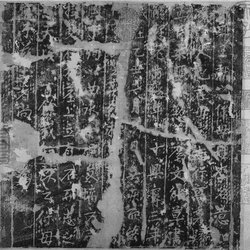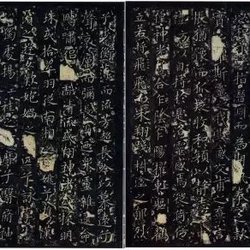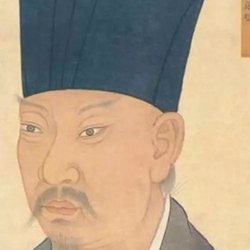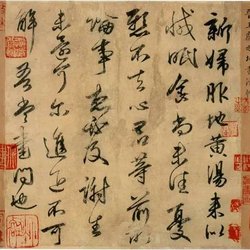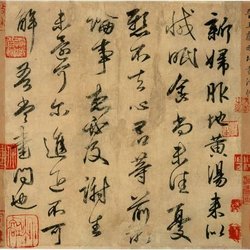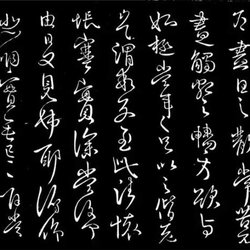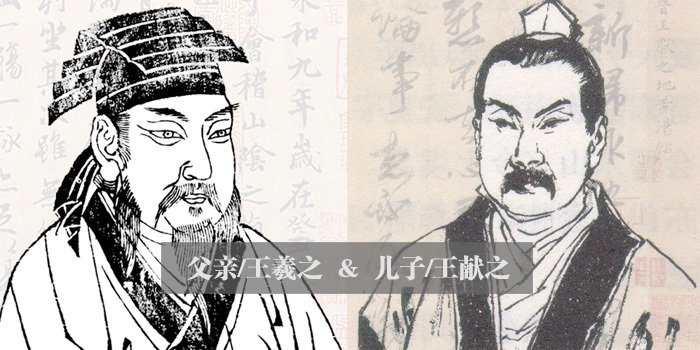
Wang Xianzhi, the seventh son of Wang Xizhi
If someone said now that Wang Xianzhi's calligraphy is better than his father Wang Xizhi's, what would you think? Maybe many people will say: "Nonsense, do you have any knowledge about calligraphy?" "Nonsense, how is it possible?" "Are you having a fever?" and so on. Don't get excited, let's talk.
Yes, it is normal and understandable to be surprised. Because we usually think that Wang Xizhi, who wrote "the best running script in the world", is the first calligrapher in China. However, this first position is due to the fact that Emperor Taizong of the Tang Dynasty respected Wang Xizhi as the "Sage of Calligraphy", which led to later generations always involuntarily thinking that Wang Xizhi's position surpassed Wang Xianzhi. In fact, this is not the case. From the perspective of the history of calligraphy, there was a period of time between the "Two Kings" and Emperor Taizong of the Tang Dynasty about 300 years ago when Wang Xianzhi's position surpassed Wang Xizhi's. That was during the period of Emperor Wu of Liang Dynasty. Zhang Huaiguan of the Tang Dynasty wrote in "Shuguan" that there is a saying in "Shishuoxinyu" called "Buy the king and you will get the sheep, don't disappoint", which means that if you want to buy Wang Xianzhi's words, you will get Yang Xin's. Still good. This can prove that at that time, Wang Xianzhi's copybooks were purchased, and Yang Xin was Wang Xianzhi's student, not Wang Xizhi's student.
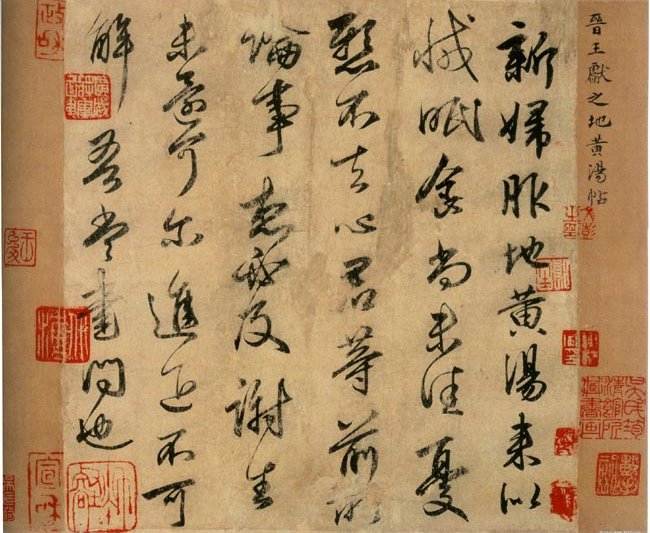
Picture/Wang Xianzhi's "Rehmannia Soup Tie", flexible, calm and dignified, one breath at a time
In fact, from Emperor Wu of the Liang Dynasty to Emperor Taizong of the Tang Dynasty, the positions of the "two kings" were equally important. From the Song Dynasty, the proportion of continuous and non-continuous strokes was almost the same. By the time of Emperor Taizong of the Tang Dynasty, because Wang Xizhi was the only one to be respected and Wang Xianzhi was suppressed, people who wrote running script in the Tang Dynasty basically used Wang Xizhi's writing style. Except for famous cursive calligraphy masters such as Zhang Xu, Huai Su and others, no one used Wang Xianzhi's brushwork, and later the fingering became bad. Because when you hold the pen with three fingers, turning left and right is not a problem, but when you hold the pen with five fingers, the hand with the fourth finger will block it and you cannot turn it. So Yu Youren uses four fingers to hold it to ensure that it is always vertical. In other words, it makes sense that calligraphy, as an art, is also a science.
Does that mean that if it weren't for Li Shimin, Wang Xianzhi would be better than his father? Does it mean that the one we worship now is Wang Xianzhi, and by the way we know that he has a father who writes calligraphy?
Let’s talk about this. The emperor's thoughts are beyond the reach of the common people. It is understandable that Li Shimin, Emperor Taizong of the Tang Dynasty, respected Wang Xizhi, but it is not easy to understand that he belittled Wang Xianzhi. He studied Wang Xizhi's calligraphy, so naturally he wanted to promote his teacher, but he mocked Wang Xianzhi's calligraphy as "withered trees" and "hungry officials". Although later generations called it too much, they had no way of knowing what Li Shimin was thinking. Mi Fu, a native of the Song Dynasty, once speculated that Li Shimin had learned calligraphy from Wang Xizhi but could not learn it well, "so he climbed up to the right army and scolded Zi Jing'er". It's not necessary to be afraid, because Li Shimin's calligraphy traveled more than 18,000 miles to Wang Xizhi, and he just scolded and dedicated it. If he wanted to worship the calligrapher, hundreds of people later would not be able to get his turn.
The father and son of Xi Zhi and Xian Zhi are similar in many ways. To take the most irrelevant aspect, both of them suffer from swollen feet, bad teeth, and often suffer from toothaches. Wang Xizhi suffered from many illnesses, and dental caries was just one of them. He said in his "Qianzhuan Post" that he could not write articles well because of toothache. Wang Xianzhi said, "Toothache suddenly occurs, and the pain is excruciating." It seems to be more serious, but he is not as reserved as his father. Even with ordinary dental disease, it is possible to cry out in pain.
Both father and son were indifferent to official duties, but given their status, they could neither think of nor obtain official positions. Wang Xizhi's official position as general of the right army was just a false title. He had no ambitions to build a temple, and he was intolerant of drama. The so-called official position was nothing more than a one-size-fits-all title. At the age of forty-three, he resigned. Even if he resigned, he even ran to his parents' graves and swore viciously: "From now on, I will have the same intention as Chongqing, and I will be greedy and adventurous... Heaven and earth will never repeat it, and the famous religion will not tolerate it." It seems that Wang Xizhi There was some resentment built up in his chest, but he had a gentle personality and didn't get angry often.
Wang Xianzhi's character also did not admire honor and honor, but he could not help himself. From being the governor of the state to being the secretary of the Central Committee, he could not retreat. The biggest sadness in his life was that he was forced to marry Princess Xin'an and divorced his original wife Xi Daomao. He once wrote to his ex-wife and said, "I originally wanted to grow old with you, but unexpectedly I said goodbye, "How can I see my sister day and night again? I can't help but cry out in sorrow. I can only give up my breath." He only lived to the age of forty-three and died before he could resign.
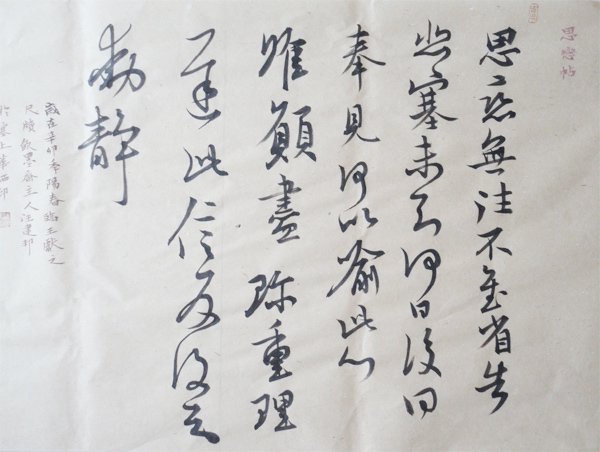
Picture/The rulers and tablets presented by the descendants came to the king
There is a theory that a person's experience will settle into his art and form its characteristics. Those who hold this theory can ask him to conduct a "blind observation" experiment, take two artists he does not know, list their biographies and works, and hide their names to see if they can match them with certainty. Since ancient times, no one has been able to do this, but theorists will say that there must be a connection, but we are limited by our knowledge and intelligence and cannot know for sure. To determine the existence of unknowable things is meaningless dream talk.
However, unlike external activities, the author's character may be reflected in his artistic style, albeit superficially, which can be regarded as a comfort to those who hold the above theory. Huang Tingjian discussed the superiority of the two kings and compared them with articles. He thought that Wang Xizhi was like Zuo Qiuming and Wang Xianzhi was like Zhuang Zhou. Compared with Wang Xizhi and Zuo Qiu Ming, it is a bit nondescript. It is said that Wang Xianzhi is like Zhuang Zhou. If Huang Tingjian means that Wang Xianzhi is more relaxed than Wang Xizhi, there is some truth. Wang Xianzhi was more simple, arrogant and wild than Xi Zhi, but his calligraphy style was in harmony with this. And temperament is often the method of calligraphy.
The biggest difference between the two is that Wang Xianzhi had a famous calligrapher like Wang Xizhi as his father, but Wang Xizhi did not. When Wang Xianzhi was learning calligraphy at a young age, he used his father as a yardstick. He once erased the words written by Wang Xizhi on the wall and wrote his own words to see if they could be authentic. Xie An asked Wang Xianzhi how your handwriting compares to that of his father. Wang Xianzhi said, I still write better. Xie An said that others don’t think so. Wang Xianzhi said, others don’t understand. Even though Wang Xianzhi was tough-talking, he probably didn't know that his father's achievements were truly insurmountable, so if he forced changes, he would lose his first gain. Wang Xizhi changed the ancient method, and Wang Xianzhi changed the royal method. This is also one of the factors why he is considered to have a lower status in art history than his father.
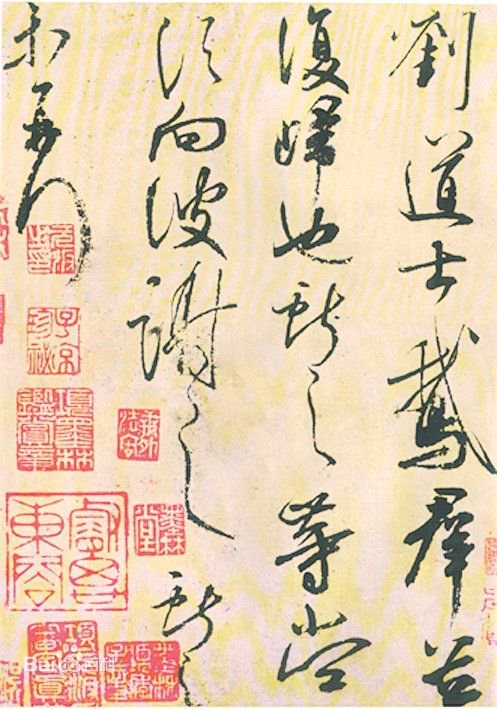
If we could put aside all backgrounds and look at the calligraphy of the two kings in isolation, more people would probably think like Mi Fu that Wang Xianzhi's calligraphy was much better than his father's. An important difference is that his artistic consciousness is more obvious than that of Wang Xizhi. Wang Xizhi also regarded writing as an artistic work, but not to the same extent as Wang Xianzhi. Wang Xianzhi once wrote a letter to someone. At the end of the letter, he said, "The handwriting on my letter is very good. You should keep it." My friend paid attention to this, which shows his efforts. The high degree of self-consciousness makes Wang Xianzhi's calligraphy not as elegant as his father's, but in terms of exhaustion of labor, he surpasses Xizhi.
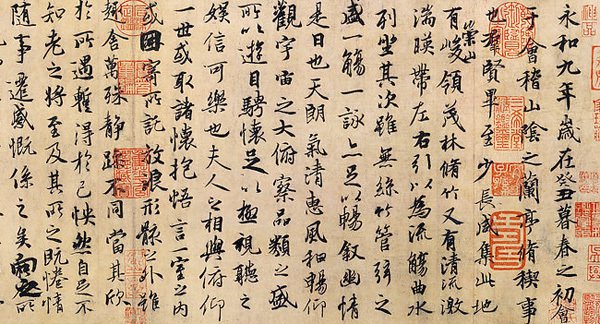
Overall evaluation of Wang Xianzhi’s calligraphy. On the basis of his predecessors, he created the "broken style" and formed new styles such as "Xingkai" and "Xingcao". He also created the "one-stroke script" of cursive script, that is, in a work, all the characters must be connected with each other and appear to be written in one stroke. Wang Xianzhi's calligraphy style is vigorous and bold, and his cymbals are powerful, which has a great influence on later generations. He and Wang Xizhi are called the "Two Kings", and some people call him, Zhang Zhi, Zhong Yao, and Wang Xizhi the "Four Sages". Famous calligraphers after the Tang Dynasty, such as Yu Shinan, Li Yong, Mi Fu, Yan Zhenqing, Dong Qichang, Zhao Mengfu, etc., each borrowed and absorbed his calligraphy style and brushwork from different aspects.
From the late Jin Dynasty to the Song and Qi Dynasties of the Southern Dynasty, Wang Xianzhi's characters were more fashionable than Wang Xizhi's. His status declined once in the Liang Dynasty and then again in the Tang Dynasty, all because he was not in the emperor's eyes. Wang Xianzhi's calligraphy is less honest and more sharp, so it is common for Li Shimin not to like it. It's a pity that the emperor has done something good, and the whole country followed it. After the Tang Dynasty, Wang Xianzhi's calligraphy was not as well preserved as that of his father Wang Xizhi. Even if we want to see the full picture of his art, we can't.
Therefore, with many layers of regret, Wang Xianzhi finally stood in the shadow of his father. Fortunately, later generations justly called Wang Xianzhi and his father the "Two Kings" together.

